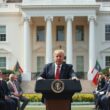The planned multi-city US tour of German Federal Agriculture Minister Alois Rainer (CSU) has been significantly disrupted, raising questions about logistical planning and potentially impacting planned agricultural policy discussions. The initial attempt to reach Omaha, Nebraska, utilizing the government’s “Global 5000” aircraft, was aborted due to unspecified technical issues, forcing the plane to return to Germany.
The abrupt cancellation of the Omaha leg, which included meetings with Nebraska Governor Jim Pillen, State Agriculture Minister Sherry Vinton and a visit to a German agricultural machinery manufacturer, as well as a planned engagement at the University of Nebraska-Lincoln, underscores the complexities and inherent risks associated with high-level international travel. While ministerial offices routinely experience travel complications, the fact that a dedicated government aircraft – a model typically reserved for critical diplomatic missions – was forced to turn back raises eyebrows. Critics are likely to scrutinize the maintenance schedule and operational readiness of the “Global 5000” particularly given the backdrop of increasing pressure on government spending.
Despite the setback, Rainer will now proceed to Washington D.C. via commercial airline, where he is scheduled to meet with officials at the US Department of Agriculture (USDA) and members of Congress. The revised itinerary also incorporates roundtable discussions with German and American business representatives. However, the truncated visit casts a shadow over the intended scope of agricultural policy discussions and represents a missed opportunity for direct engagement with key stakeholders in Nebraska, a state with significant agricultural output. Observers will be keen to assess whether the remaining agenda in Washington can adequately compensate for the loss of the Nebraska leg and yield the intended results in a climate of increasing trade tensions and diverging regulatory approaches between Germany and the United States.





